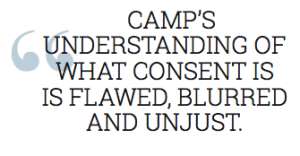Consent and concern

A rape victim’s abuse follows her into the court room
“Why couldn’t you just keep your knees together?”
In September 2016, Canadian Judge Robin Camp faced removal from the bench for his candid comments over a rape case he presided over in 2014.
The judge then faced a week-long judicial council hearing, which determined whether he should be removed from the bench.
According to CNN, the case took place in 2014 when Camp covered a case in which a 19-year-old woman said that she was raped over a bathroom sink during a house party.
Camp than provided the young woman with some sound advice.
Camp asked her why she didn’t “skew her pelvis” or push her bottom into the sink to avoid penetration.
He openly wondered, “Why couldn’t you just keep your knees together?”
A victim trusted the court to respect her and bring her justice, but instead she was met with personal criticism.
Issues of sexual assault have plagued college campuses across the U.S., and while these issues of sexual violence increase, there are candid conversations between students and administration concerning sexual violence.
From Harvard’s “Our Harvard Can Do Better” campaign, which hopes to dismantle rape culture at Harvard University, to Liberty University’s “#SpeakUpLU” campaign, which urges students to not only speak against sexual violence but to also become aware of it, universities are urging students to advocate for those victimized while also educating themselves.
According to RAINN.org (Rape, Abuse & Incest National Network), over 300 colleges across the nation have participated in RAINN Day, which is an annual day of action during the month of September to raise awareness and educate students about sexual violence on college campuses.
It is a grassroots program designed to empower college students to educate their peers about risk reduction and recovery resources on their campus.
While American students are taking the initiative to educate themselves on sexual assault, those with the power to be a voice for the voiceless and seek justice for those victimized remain silent, uneducated and lack the ability to remain neutral toward their own bias against sexual violence. The power remains with the gavel.
Canada’s Department of Justice states that the criminal law process is fundamentally between the accused and the state.
But there is increasing recognition of the importance of hearing victims and they are starting to have a greater voice and role in the legal process.
However, it seems the victim’s voice was clearly looked at as if Charlie Brown’s teacher was talking.
Her story was hard to understand and clearly went over the authoritarian’s head.
Growing up, my mother always said, “If you have nothing nice to say, don’t say anything at all.”
The Bible says in James 1:19 “Be slow to speak, quick to listen, and slow to anger.”
The judge should have taken some of this advice.
Although age does not align with maturity, Camp, 64, asked the victim, clearly ignorant to the fact that according to Canada’s sexual assault website, sexualassault.ca, of every 100 incidents of sexual assault, only six are reported to the police.
The victim decided to seek justice through the judicial system and in the process, got revictimized.
According to CNN, on the subject of sex in general, and sex with young women in particular, he said, “Young wom[e]n want to have sex, particularly if they’re drunk.”
Camp’s understanding of what consent is is flawed, blurred and unjust.
According to Canada’s Womens’ Legal, Education and Action Fund (LEAF), a person cannot say they mistakenly believed a person was consenting if that belief is based on their own intoxication, they were reckless about whether the person was consenting, they chose to ignore things that would tell them there was a lack of consent, or they did not take proper steps to check if there was consent.
Objectivity is key, especially when it comes to issues of sexual violence.
We need judges who will be able to look at both sides of the issue who are educated and aware of what sexual violence is and how to deal with it.
However, Camp was neither, and his statements seem to have justified this situation because, in Camp’s mind, she wanted it because she was drunk.
Camp ultimately acquitted the man charged with the crime and then told him: “I want you to tell your friends, your male friends, that they have to be far more gentle with women. They have to be far more patient. And they have to be very careful. To protect themselves, they have to be very careful.”
Camp’s aforementioned comments seem to advocate for the accused and victimize the victim.
The verdict was overturned on appeal. A new trial is scheduled for November.
Williams is an opinion writer.


